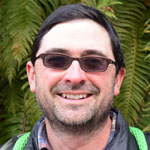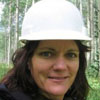


Select one of the options below:
Start building the specialized knowledge to advance in the field of natural resources.
Add your name to the legacy of graduates who have become effective managers for some of the nation's most prominent natural resources management organizations, including:
CSU's online Master of Natural Resources Stewardship was designed for professionals seeking the necessary skills and knowledge to advance in the field of natural resources. The program provides a broad education, with the opportunity to further specialize in one of three areas:
You will finish this program as a well-rounded leader, equipped with an understanding of the interconnectedness of natural resource management systems and how that lends itself to solving real-world problems from a holistic viewpoint. The curriculum is immediately applicable to current issues within the industry, with natural resources management courses that cover topics such as:
Elective credits allow you to tailor your natural resources degree to encompass a wide range of skills to suit your career path.
As any environmental steward knows, our world has finite resources, but is experiencing increased demands as our population grows. Qualified natural resource planners, managers, and conservationists are needed to generate innovative solutions for managing our natural resources.
Thousands of jobs in environmental and renewable natural resource fields are expected to open in the next few years, according to the USDA, but there currently are not enough college grads to fill them. CSU's online Master of Natural Resources Stewardship prepares you for a variety of positions, including:
Prepare to meet the challenges of the future as you learn about the interaction between humans and the environment, and the complexity of natural resource management systems.
Ideal for professionals who have experience with natural resources and have built a network within the industry, the Master of Natural Resources Stewardship prepares you to be a leader in roles such as:
Employment within this industry is projected to grow faster than the average over the next decade according to the Bureau of Labor Statistics. Heightened public interest in the hazards facing the environment, as well as the increasing demands placed on the environment by population growth, is expected to spur demand for highly educated natural resource planners, managers, and conservationists. This degree is designed to prepare students to lead projects and programs that answer big-picture challenges associated with human interaction with the environment.
The table lists some recent alumni of the M.N.R.S. program. Visit their LinkedIn profile to see what skills and experiences they brought to their current position in addition to their graduate degree. You can also use LinkedIn to connect with and reach out to these individuals with questions about the industry.
Note: You will need a LinkedIn account to connect with alumni.
| Name | Degree Earned | Job Title | Employer/Organization | |
| Cidney Handy | M.N.R.S. Ecological Restoration | Stewardship Coordinator | Wyoming Stock Growers Land Trust | |
| Kirsten Lyons | M.N.R.S. Ecological Restoration | Stewardship Director | Friends of the St. Clair River | |
| Bradley Shoemaker | M.N.R.S. Ecological Restoration | Chief | Air Force Wildland Fire Branch | |
| Carter Oliver | M.N.R.S. Ecological Restoration | Harrison County Extension Director | Iowa State University Extension and Outreach | |
| Chrissy Remein | M.N.R.S. Forest Sciences | Hudson River Watershed Project Manager | Riverkeeper | |
| Ericka Buckreis | M.N.R.S. Ecological Restoration | Natural Resources Specialist | US Navy | |
| Mary Young | M.N.R.S. Ecological Restoration | Physical Scientist/ Project Manager | Office of Legacy Management, Department of Energy |

"I liked that I could earn this degree online without needing to change locations, work situations, or uproot family to attend graduate coursework. The flexibility combined with top-notch faculty and research sold me on the value of this program."
"Each course runs parallel to real-world scenarios I could immediately apply to current work projects. I am more confident approaching restoration work and capable of addressing complex projects. This has led to interesting work, new opportunities, and a fresh approach to what career choices I could take."
"I had an excellent experience with the M.N.R.S. program and would surely recommend this to others in search of quality, affordable, and relevant coursework in Natural Resources. Having a program that can bridge knowledge gaps for working and non-traditional students is unique and a great option for those holding down other life commitments such as work or family."
The goal of ecological restoration is a stable and functioning ecosystem that can withstand stresses and provide ecosystem services, such as clean water, wildlife habitat, biodiversity, and more. Students who have the skills to evaluate and manage these issues can help maintain and improve our natural resource environments, help prevent extinction of species, and maintain healthy hunting and fishing environments.
Ecological restoration uses human intervention to direct and/or accelerate secondary succession following a disturbance. Students in the program learn how to influence the type of vegetation that re-establishes itself and the speed with which recovery occurs.
The natural resource stewardship degree requires completion of 30 credits, including 11 credits of required core coursework, 10 credits in the focus area (ecological restoration), and 10-12 credits of electives. This is a coursework-intensive degree and does not require completion of a thesis.
To further diversify your curriculum, choose a minimum of 10-12 elective credits. These courses can be from any of the specialization areas or from other credit courses that pertain to your professional and education goals. Electives must be above the 300 level and be approved by an academic advisor.
The following course is also available as an elective:
NR 565 – Principles of Natural Resource Ecology (3 cr.)
NR 565 is a required course for students who have not taken a college-level ecology course.
The M.N.R.S. degree in forest science explores an interdisciplinary field that addresses resource management challenges related to forests around the world. According to the USDA Forest Service's Forest Inventory and Analysis National Program (2012), forests cover 766 million acres of land in the United States. As well as providing a sense of place and natural beauty, forests provide a myriad of tangible benefits to society; e.g., raw materials, places for recreation, oxygen production, and a sink for carbon. Additionally they can reduce erosion, enhance aquifer recharge, filter out pollutants, and provide habitats for wildlife.
This online forestry degree applies the physical, social, and biological sciences to the field of forest sciences, a methodology that allows individuals to make fact-based decisions in managing these environments. Proper resource management can help reduce the impacts of wildfires, insect and disease attacks, and deforestation, which pose threats to forests and the communities they benefit.
CSU's faculty take an applied and broad-based approach to education, covering the technical and human dimensions aspects of forestry. This means you learn theory, as well as complete coursework and assignments that prepare you to immediately apply what you learn to the actual situations you'll face at work.
Take forestry courses online in a flexible format that lets you study from wherever you are. Knowledge gained applies to forests all over the world, which means you'll be trained to work globally, wherever you find yourself.
Colorado State University was one of the first forestry schools in the nation, dating back to 1904. This long tenure and accomplished history has elevated CSU's reputation in this field as an authority throughout the world. With this comes an ability to recruit some of the nation’s top forestry scientists to inform curriculum, as well as an opportunity for students to become a part of a large professional network.
Within the context of forestry, you will gain technical skills in:
Additionally, you will learn about topics such as scarcity, the aesthetic benefits of forests, biological diversity, and gain foundational skills that will prepare you to work in any forest environment.
The natural resource stewardship degree requires completion of 30 credits, including 11 credits of required core coursework, 9 credits in the focus area (forest sciences), and 10 credits of electives. This is a coursework-intensive degree and does not require completion of a thesis.
To further diversify your curriculum, choose a minimum of 10 elective credits. These courses can be from any of the specialization areas or from other credit courses that pertain to your professional and education goals. Electives must be above the 300 level and be approved by an academic advisor.
The following course is also available as an elective:
NR 565 – Principles of Natural Resource Ecology (3 cr.)
NR 565 is a required course for students who have not taken a college-level ecology course.
The rangeland ecology and management area of specialization focuses on linking bio-physical and human systems to ensure sustainable practices.
Students in the program learn how to classify and manage rangelands based on:
Concepts covered pertain to both domestic and wild grazing animals, include a variety of grassland and shrubland types, and emphasize adaptive management techniques.
The natural resource stewardship degree requires completion of 30 credits, including 11 credits of required core coursework, 9 credits in the focus area (rangeland ecology and management), and 10 credits of electives. This is a coursework-intensive degree and does not require completion of a thesis.
To further diversify your curriculum, choose a minimum of 10 elective credits. These courses can be from any of the specialization areas or from other credit courses that pertain to your professional and education goals. Electives must be above the 300 level and be approved by an academic advisor.
The following course is also available as an elective:
NR 565 – Principles of Natural Resource Ecology (3 cr.)
NR 565 is a required course for students who have not taken a college-level ecology course.
This program's holistic approach to providing a comprehensive understanding of the natural resource management system further affords the opportunity to hone your skills in ecological restoration or rangeland ecosystem science.
This natural resources management degree is a product of the Department of Forest and Rangeland Stewardship's rich history and long-standing reputation that has flourished at CSU since the turn of the 20th century. At the time, the university was responding to societal needs and pressures regarding the conservation and sustainable management of natural resources and the rising concerns for managing them. Those same concerns exist today, perhaps now more than ever.
This program, and the faculty behind it, share the common goal of connecting prospective students with the growing demand for highly educated professionals with a passion for making long-lasting impacts in natural resource management.
Strong interdisciplinary faculty who have direct experience with the economic, social, political, and ecological impacts of land degradation bring real-world information to the program. Currently working on natural resource initiatives with federal, state, local, and nonprofit agency partners, our faculty are researchers who bring their inside perspective and first-hand knowledge to the classroom, preparing you to be a leader in the industry.
As a student in CSU's online Natural Resources Stewardship program, you receive the same education, learn from the same faculty, and earn the same regionally accredited degree as students on campus. Additionally, you can expect:
Learn more about CSU's rankings and accolades.

Sonya Le Febre is an assistant professor in the Department of Forest and Rangeland Stewardship where she advises students in the Master of Natural Resources Stewardship program and serves as the department graduate program coordinator. She holds an M.S. and Ph.D. in Rangeland Ecosystem Science from Colorado State University, and a B.S. in Biology from the New Mexico Institute of Mining and Technology.

Casey Matney is an Assistant Professor and Agriculture/Horticulture Extension Agent within the School of Natural Resources and Extension at the University of Alaska Fairbanks. In Alaska, Casey’s program responsibilities span the spectrum from livestock and range to soils and horticulture. He is a primary investigator and collaborator on a number of research and outreach projects investigating: forage production, soil health, integrated pest management, and produce safety. Prior to his position in Alaska, Casey was a Rangeland Extension Specialist in Colorado for five years. Casey has been instructing college courses in rangeland management since 2006. In 2010, he received a Ph.D. from Oregon State University for his research studying winterfat and grazing ecology in the Catlow Valley of Oregon.

Wilfred Previant is an Assistant Professor of Forestry in the Forest and Rangeland Stewardship Department at CSU, where he teaches courses in forest management and measurements. His research includes forest inventory and analysis, monitoring, adaptive forest management, silviculture, and carbon management. Wilfred received his PhD in Forest Science from Michigan Technological University.

Robin Rothfeder is an Assistant Professor of Natural Resource Policy in the Forest and Rangeland Stewardship Department at CSU. Robin's classes use social-ecological challenges and opportunities as the focal point for engaged, interactive learning experiences. His teaching in the M.N.R.S. program focuses on environmental impact analysis as governed by the National Environmental Policy Act (NEPA). His research covers two broad topics: (a) collaboration in social-ecological systems, and (b) water resource planning, policy, and management. In both areas, he takes an interdisciplinary and mixed methods approach aimed at meeting real-world community needs.
Robin has a diverse interdisciplinary background, including undergraduate degrees in Environmental Science and Environmental Economics from the University of California-Berkeley, as well as a master’s degree in Environmental Humanities and a PhD in Ecological Planning from the University of Utah.

Jeremy Sueltenfuss is an Assistant Professor of Ecology in the Forest and Rangeland Stewardship Department at CSU. He is generally interested in the ecological impacts humans have on the natural world, and how to effectively restore ecological integrity and ecosystem functions. He collaborates with local, state, and federal agencies on wetland and floodplain restoration projects, although his interests in increasing the efficacy of ecological restoration encompass all ecosystem types. He holds a PhD in Ecology from Colorado State University.
| Fall semester | April 1 |
| Spring semester | September 15 |
Applications will be reviewed and decided upon within 2-4 weeks following each application deadline.
Start your application online and upload materials directly into the online system. You can save your progress and return any time.
Apply NowThe Master of Natural Resources Stewardship requires that students have the following:
Prepare the materials below and upload when you apply online:
Three letters of recommendation: You will provide information about your recommenders in the online application. CSU will contact them with instructions and a link to a secure form they will submit on your behalf. Request letters from at least two of the following:
Resume: Outline the professional employment, collegiate work, and any publications, exhibitions, service activities, prizes, awards and other recognitions.
Statement of purpose: Compose a short response (250 words or less) to each of the four prompts below. Your narrative and written communication skills will be evaluated by faculty in the Master of Natural Resources Stewardship program.
Complete the online graduate application and pay the nonrefundable application processing fee (payable online). As soon as you have completed the required information, please submit your application. Your application will not be reviewed until it is complete and all required materials have been received. When applying, select the program of study you’re applying to:
CSU's Graduate School offers several application fee waiver opportunities. Visit their website to determine if you are eligible for a waiver.
Request one official transcript of all collegiate work completed from all institutions attended. Transcripts from Colorado State University are not required. Transcripts must be received directly from the originating institution to be considered official.
Please Note: Students may be unconditionally admitted and registered in their first semester of courses with an unofficial transcript. Official transcripts must be submitted, prior to or during your first semester, before you can register for your second semester of graduate work. Failure to meet this condition will result in your dismissal from the Graduate School.
Electronic (preferred): Digital Transcripts must be submitted by the originating institution using a secure service such as parchment, eScrip-Safe, the National Student Clearinghouse, or e-Quals. Transcripts received via emails are considered unofficial. Use institution code 4075 for Colorado State University or gradadmissions@colostate.edu if the secure service requires an email address.
Mail (if necessary) Graduate Admissions Colorado State University – Office of Admissions 1062 Campus Delivery Fort Collins, CO 80523-1062
View your application status at any time to ensure your application checklist is complete or to check on updates.
Proof of English language proficiency is required for applicants from countries or United States territories where there are official languages other than (or in addition to) English. This includes the U.S. territories of American Samoa, Guam, the Northern Mariana Islands, and Puerto Rico.